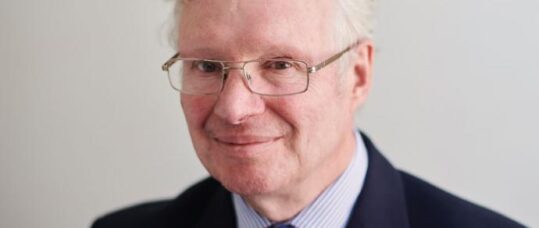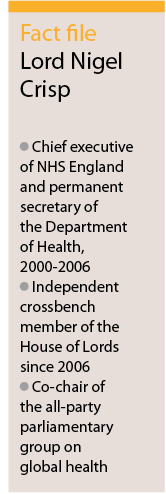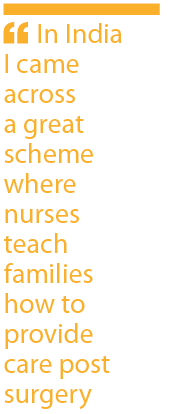‘The biggest thing we can do for health globally is to strengthen nursing’

Lord Nigel Crisp, head of the Nursing Now global campaign to improve nursing, talks to Alice Harrold about what he hopes to achieve
What is Nursing Now and how did the campaign get started?
I chair an all-party parliamentary group on global health and we did a review of nursing globally and came up with three clear conclusions. The first one is that the world won’t achieve universal health coverage, which is its aim, unless we strengthen nursing. Secondly, nurses globally are too often undervalued and underutilised, in the sense of not being able to work to the top of their licence. This is more true in countries like India, where you see perfectly well-trained nurses who have to wait around as handmaidens to doctors. And thirdly, if we do strengthen nursing, we will have an impact on three of the world’s sustainable development goals, which are to improve health, to promote gender equality and to strengthen economic development. So we set up a global campaign to strengthen nursing.
With our patron, the Duchess of Cambridge, we launched the campaign in five countries on 27 February this year. Now, without any money being given, we have reached a total of 40 national Nursing Now groups around the world within five months. So nurses really got behind this idea and are supporting this campaign.
We think that one of the biggest areas where nurses can make a difference to global health is with developing primary care. In most of the world, primary care is nurse based with doctor input, rather than doctor based with nurse input. How far that will go in this country, I don’t know. The second big area for development is the management of non-communicable diseases, which is increasingly the province of nurses. Third is promotion, prevention and health literacy.
How much support have you got in the UK?
There’s terrific support for us in the UK. All the senior nurses and all four of the chief nursing officers have been very supportive. I suspect we will see some national campaigns started in the UK in the next few months.
The campaign is calling for greater investment in nursing. Is nurses’ pay part of that?
Related Article: MPs vote to legalise assisted dying in England and Wales
Clearly it depends on the country and we’re not involved in the politics of any individual country – you can imagine the differences between Jamaica, Ghana, Uganda, Singapore and the UK. With investment, we’re talking about a need for nine million more nurses worldwide, and also the need for those nurses to be properly educated and supported. That will include pay and also working conditions. We’re not trying to tell countries what to do but we know that there’s a need for greater nursing investment in healthcare globally.
How do you think the new roles of nursing associate and nurse apprentice will affect your goals for improving nursing?
As the campaign focuses more on Africa and countries where there are big health needs, we have seen people who have had perhaps six months of training, who have huge roles as team leaders. I think the same thing could be said in this country, that the nurses can take on bigger roles and provide a more supervisory, leadership and referral role for skilled workers.
Do you expect to see changes for nurses who are already qualified or are you focusing on the next generation?
I think we could see change very quickly. I had a check-up with a nurse in my primary care surgery and she said to me: ‘There’s much more we could do if we were able to’. In the UK we have seen in the last 20 years primary care gain a lot more nurse input, and I think that will continue.
Is there anything that primary care in the UK could learn from other countries?
I think there are some countries that are doing more. One of the big things we need is much more focus globally. I think the same goes for nurse education and nurse training. I think nurses should take responsibility for primary care as there is a lot of evidence that that can be very powerful.
 Is there anything you think the UK could learn from nursing in other countries?
Is there anything you think the UK could learn from nursing in other countries?
I think there are many good examples of individual things that are happening around the world. In some countries there are many more nurse-led services, but that’s partly because there aren’t any doctors in rural areas. In terms of the big issues, they are the same everywhere. We’re all trying to develop primary care; we’re all trying to develop prevention and promotion; we’re all trying to grapple with non-communicable diseases. There’s no silver bullet to solve these problems but I know that nurses coming back to the UK from working in other countries say they learned how to do things differently at a micro level, including how to work more effectively with the community.
I came across a great scheme in India – a cardiac surgery unit. It’s a very good unit, the same standard as in the UK, but very, very cheap. The nurses have a big role in it. Before surgery they work with patients and carers to educate them about what to expect after surgery. As a result, they’ve managed to reduce readmissions and infection rates. They train the spouses or other family members or carers to look after the patients once they get back home.
There are similar initiatives in the UK. It’s a great scheme and it’s had a real impact and is now being rolled out in all the hospitals run by that organisation. Remember, most of these countries don’t have government funding.
How do you think the new roles of nursing associate and nurse apprentice will impact on your goals for improving nursing?
As the campaign focuses more on Africa and countries where there are big health needs, we have seen people who have had perhaps six months of training, who are providing some role to healthcare and in those situations nurses have huge roles as team leaders. I think the same thing could be said in this country, that the nurses can take on bigger roles, but also amongst that is providing a more supervisory, leadership and referral role for the skilled workers.
What impact did it have on the campaign when the Duchess of Cambridge agreed to come on board?
Related Article: Assisted dying bill: Two-thirds of GPNs ‘supportive’ but less sure on nurse involvement
Having her as our patron helps to attract attention to the campaign. When we launched in five different countries, she was there with a video link alongside the head of the World Health Organization (WHO) in Geneva and people in South Africa and in America. So we had a fantastic launch; she was great. We actually have another princess champion, the Princess of Monaco. And we also have a whole series of other prominent figures, many doctors globally, who are championing our campaign.
They all support our core message, which is very straightforward: pay more attention to nurses and you’ll have a big impact. When you talk to senior doctors in the UK, they get it. They understand that if you are a leading heart surgeon for example, the quality and the ability of your nurses to take on new tasks is immensely important. So there’s huge support for it.
I think the most remarkable thing is that we didn’t ask people to set up campaigns in other countries, yet there were 40 going after three months and we didn’t give any money to them because we haven’t got any money. This is gaining its own momentum because people globally know this is a good idea for nursing.
One of my colleagues was in Kenya last week. In Kenya, this is all over the country. There are masses of nurses involved and the government there is responding. They are starting to think much more about how to engage nurses. The chief nursing officer there is very much part of it and they’ve got banners and songs about Nursing Now – all kinds of things.
I was in Uganda recently. I heard the nurses sing the nurses’ anthem, which was very moving. They all stood with their hands on their hearts, singing the anthem and shouting ‘Nursing Now’.
So this is viral – it isn’t a planned thing, it isn’t a bureaucratic thing, it isn’t a government thing. It is a central movement trying to change the way people think about nurses. And the reason that I’m involved is straightforward; when we did that review I came to believe that one of the biggest things we could do to improve health globally was to raise the status and profile of nurses.
What can our readers do if they want to get involved?
They can go on the website and sign up. They can call the local Nursing Now groups and they can get involved in lobbying for these things locally. For example, there’s a professor of nursing in Edinburgh, Aisha Holloway, who is setting up Nursing Now in Edinburgh, to carry these messages.
What other campaigns do you see happening for nursing in the next few years?
Related Article: Government accused of ‘avoiding’ practice nurse pay disparities
I think we all need to think of how we’re going to celebrate Florence Nightingale’s double centenary in 2020 because that will be a big event. We’ll no doubt have nurses on the stamps in the UK. Florence Nightingale is the only global iconic nurse. I know that we’ve also got Mary Seacole, who is obviously known in Jamaica and the UK, and Clara Barton from the US, but they are not known internationally. There are actually more Florence Nightingale societies in Japan than there are in the UK; she really is a global figure. I think 2020 is going to be a very important year for nursing and this campaign will culminate then. So I hope by then, we will have started to see a change in attitude, so that nurses are no longer invisible, but are seen as what they are, which is fully-qualified professionals, not just some nice woman doing some nice job but proper professionals, and not just in the UK.
What will be next after the Nursing Now campaign ends in 2020?
This campaign is unique in that it is being run in collaboration with the WHO and the International Council of Nurses (ICN). There isn’t another campaign globally that’s run in collaboration with them. Any legacy that we create will belong to the ICN. We have a campaign board with people from 16 countries, so it is representative in that sense, but we’re not elected. We’re aiming to try to make a change but the long-term sustainability of this needs to be with the democratic organisations, which in this case are the WHO and the ICN.
My hope is that by 2020 all boards, conferences, congresses and commissions on health will have nurses properly involved, and there’s nothing else we will need to do, because if the nurses are involved, they’ll make sure that things happen.

See how our symptom tool can help you make better sense of patient presentations
Click here to search a symptom


Lord Nigel Crisp, head of the Nursing Now global campaign to improve nursing, talks to Alice Harrold about what he hopes to achieve



